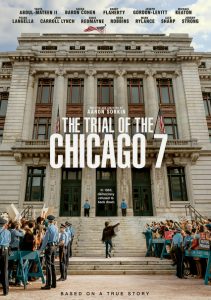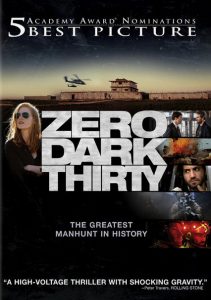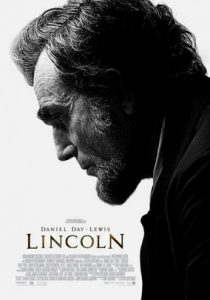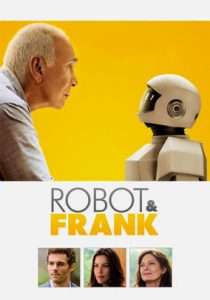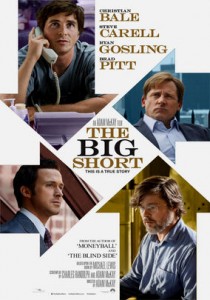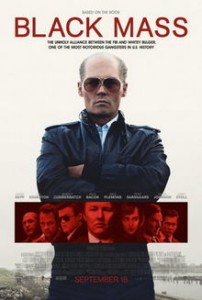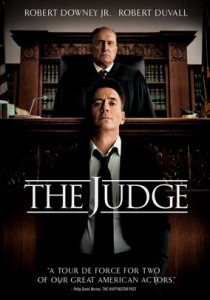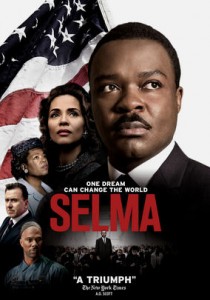The Trial of the Chicago 7-2020
Director Aaron Sorkin
Starring Sacha Baron Cohen, Eddie Redmayne, Joseph Gordon-Levitt
Scott’s Review #1,136
Reviewed April 26, 2021
Grade: B+
The Trial of the Chicago 7 (2020) is a Hollywood film with an important message. It’s conventional and explores a historic episode of great importance, and the story is told well with many liberties taken for effect.
Director Aaron Sorkin sticks to a familiar formula, peppering humor with the standard heavy drama, and creates a film that will appeal to mainstream audiences. He was rewarded with several Oscar nominations for the film.
It’s a crowdpleaser first and foremost.
I would have been bothered more by the traditional approach had the subject matter not been so weighty or not presented in a left-leaning way, which it was.
Solidly anti-war, this made the film more powerful and meaningful, though some of the comedic elements seemed silly and trite, and added to lighten the mood.
The period is 1969, though the main subject at hand occurs in 1968, so there is much back and forth. After antiwar activists clash with police and National Guardsmen at the important 1968 Democratic National Convention in Chicago, violence erupts.
Charged with conspiracy and inciting to riot, seven of the protestors are put on trial. The charges are controversial because a new president, Richard Nixon, has just been elected, and a revenge-seeking Attorney General lusts for an example to be made of them.
The casting is tremendous.
John Doman is fabulous in the quick role of the evil Attorney General John Mitchell (historians know that he was later a convicted criminal), and Frank Langella makes Judge Julius Hoffman into the asshole he was.
I’ve never been as impressed with Sacha Baron Cohen (or rather, this is the first time I’ve been impressed) as he steamrolls into the role of Abbie Hoffman, a social and political activist.
Eddie Redmayne, John Carroll Lynch, Mark Rylance, and Joseph Gordon-Levitt also deserve praise as either a member of the seven or lawyers for either side.
Whether or not specific accuracy is achieved is not top of mind for me. The Trial of the Chicago 7 provides a historical account of the events that unfolded the night of the riots and the subsequent courtroom proceedings the following year. I’m okay with a few exaggerations for cinema’s sake.
The product is a safe and glossy affair and incredibly slick to the eyes.
The editing is fantastic. Snippets of the real Chicago riots of 1968 are interspersed with the created scenes, creating a sound effect through the back and forth. But before this, real-life comments from Martin Luther King Jr. and Robert Kennedy kick off the action. Both assassinated, their existence is essential to witness before the point at which the film is ever made.
Justice is not always served. Sorkin’s point in including the sequences seems to hit home that there are good politicians out there fighting for truth and fairness.
My favorite scene is the final one. At the end of the trial, Hayden (Redmayne) is given a chance to make a case for a lenient sentence. However, over Judge Hoffman’s objections, Hayden uses his closing remarks to name the 4,752 soldiers who were killed in the Vietnam War since the trial began.
This act prompts many in the court to stand and cheer. Viewers will as well.
The main problem that gnawed at me is the same concern I had when I realized that Sorkin was at the director’s helm. He is a dazzling screenwriter, making the dialogue crisp and rich with intelligence.
But, known for television successes such as The West Wing (1999-2006) and Sports Night (1998-2000), this causes The Trial of the Chicago 7 to look like a made-for-television production versus a raw film experience.
I realize that Sorkin will likely never be a film auteur. Sorkin is the reason that The Trial of the Chicago 7 is a B+ film and not an A film.
The late 1960s were a prominent and sometimes tragic time in United States history. The Trial of the Chicago 7 delves into a pivotal event where several were railroaded and punished for something they did not do.
The film makes sure that the railroaders get their just desserts, and that’s fun to see.
Oscar Nominations: Best Picture, Best Supporting Actor-Sacha Baron Cohen, Best Original Screenplay, Best Cinematography, Best Film Editing, Best Original Song-“Hear My Voice”
